Graduate School of Theology (GST) students on Redlands’ Marin Campus in San Anselmo, CA need a wide range of resources to support their research, work, and ministries. From ordination exam study guides to spiritual direction handbooks, the collection at
the San Francisco Theological Seminary (SFTS) Library is not a typical library collection because the students here at the seminary are not your typical students.
Not everyone graduates to get behind the pulpit. Instead, they channel their passion into chaplaincy, education, or in establishing non-profits or grassroots campaigns. Students often research, address, and speak out about traumas or problems they’ve witnessed in their communities. They want the academic background for designing solutions and healing processes. As their librarian, I’m proud to be a sounding board for their research topics and to introduce them to the variety of sources they can synthesize into innovative dissertations and projects.
One reason many students choose this graduate institution over others is the freedom to take a panoply of courses from all the member centers and schools of the Graduate Theological Union. These seminaries and centers merged their libraries to create one of the largest, most diversified theological libraries on the West Coast, the Graduate Theological Union Library. The San Francisco Theological Seminary library is a branch of this library, which means that all physical and electronic resources are shared between the libraries and their patrons. Moreover, Graduate School of Theology students get free walk-in access to the UC Berkeley libraries.

Studying amidst castles seems like a fantasy, but it’s daily life for the students here on campus. They enjoy views of the Hogwarts-like seminary buildings and Mt. Tamalpais as they roam the library’s halls and the labyrinth outside the library. Geneva Hall houses not only the library, but also one of the chapels, faculty offices, and a few classrooms. Functionally and geographically, the building is at the heart of the campus.
If library smells are dear to your heart, the book smell here will make you especially happy. There is a rich archival collection housed here, featuring artifacts, missionaries’ diaries, and rare books.

If you have questions about the library or find yourself researching an advanced religious or theological topic, please call, email, visit, or chat.
-Stephanie Miller
Branch Librarian
Graduate School of Theology - Marin Campus; home of the San Francisco Theological Seminary










